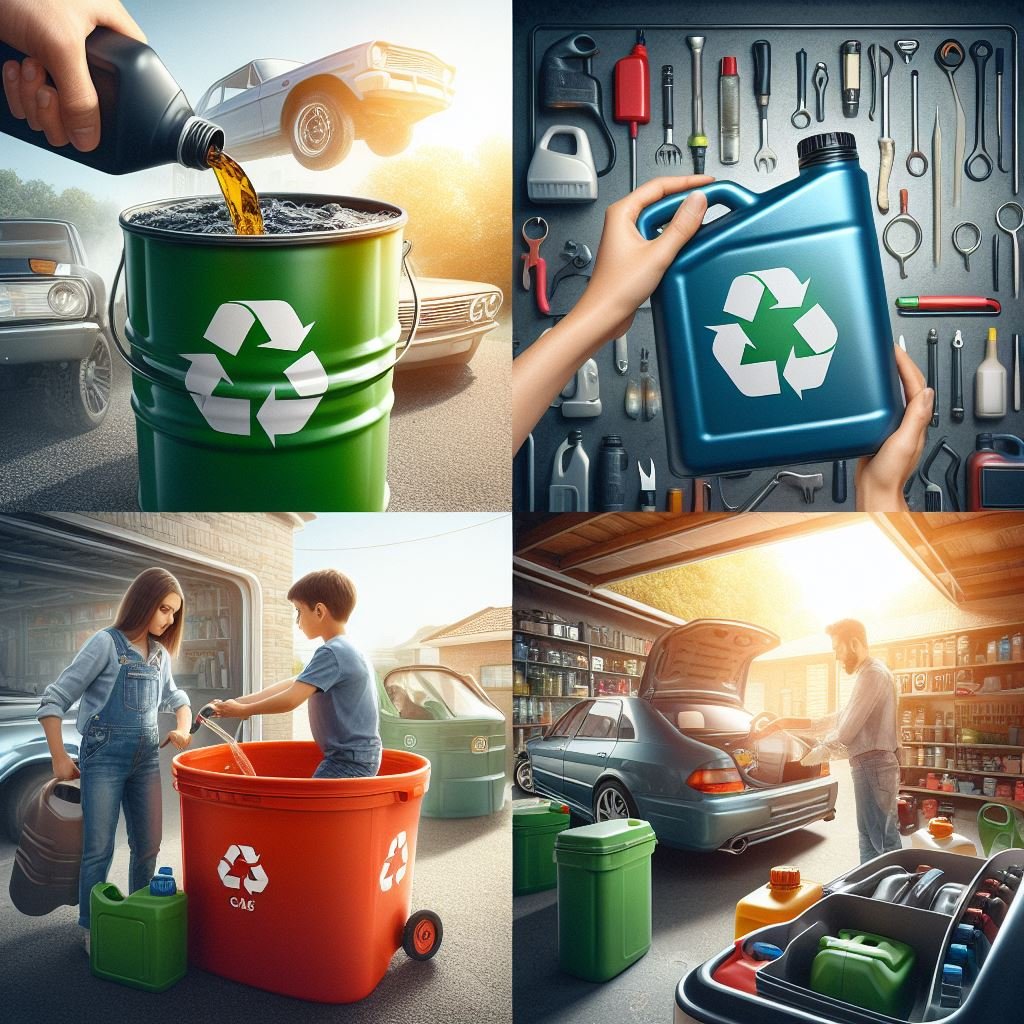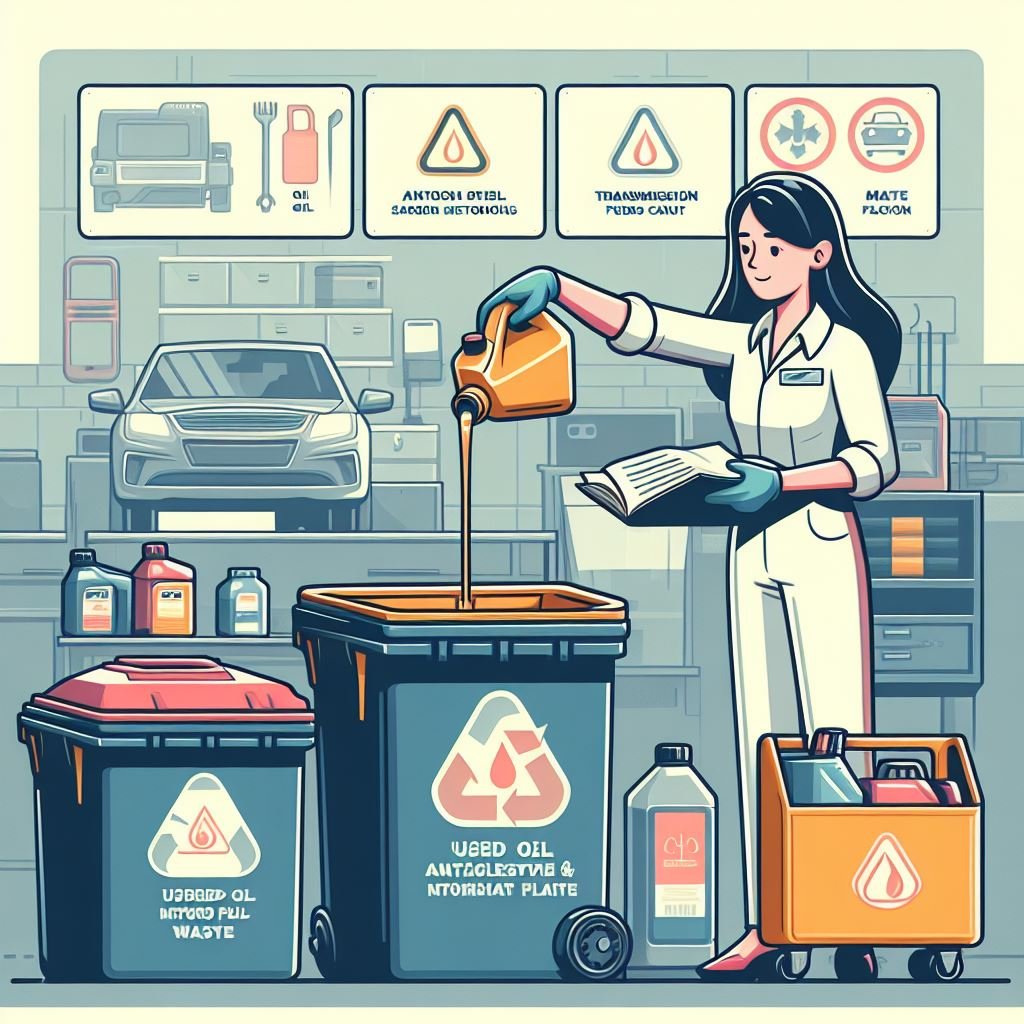
المقدمـة
The importance of properly handling automobile fluids
The environmental hazards of improper disposal
Instead of proper disposal, countless vehicle owners release a staggering amount of used automotive fluids annually, polluting our environment. The improper disposal of used oil, antifreeze, and other automotive fluids can lead to severe environmental hazards, including water and soil contamination. These pollutants can harm wildlife, damage ecosystems, and pose risks to human health. Therefore, it is crucial to understand the importance of handling automotive fluids responsibly.
The purpose of this blog post and the need for responsible fluid management
The primary goal of this blog post is to educate our readers on the best practices for managing used automotive fluids, highlight the potential dangers of improper disposal, and offer actionable tips for eco-friendly fluid handling. By following these guidelines, you can play a significant role in protecting our environment and promoting sustainable practices in your community. Moreover, responsible fluid management not only preserves nature but also helps ensure a safer, healthier future for generations to come.
In the following sections, we will dive deeper into the various types of automotive fluids, their environmental impact, and the best practices to handle them. So, let’s embark on this journey towards a cleaner, greener lifestyle together.
This post seeks to raise awareness about the harm caused by improper disposal of automotive fluids and suggests practical solutions for each individual. Please read on to learn how you can properly manage used motor oil, antifreeze, brake fluids, and other automotive chemicals while protecting our environment. Our planet will thank you for it!
المحتويات
I. Understanding different automotive fluids and their impact on the environment
II. Best practices for handling used automotive fluids
III. Eco-friendly alternatives to traditional automotive fluids
IV. Educating others and raising awareness
I. Understanding different automotive fluids and their impact on the environment
A. Used Motor Oil – A Threat to Our Ecosystems
Used motor oil poses significant dangers to the environment. Just one gallon of improperly disposed motor oil can contaminate up to one million gallons of water, making it unsafe for consumption and harming aquatic life. Moreover, used motor oil contains toxic chemicals and heavy metals that can pollute soil, groundwater, and surface water. By recycling and disposing of used motor oil correctly, we can vastly reduce these risks and protect our ecosystems.
B. Antifreeze – hidden dangers
Antifreeze, a vital automotive fluid, comes with its own set of hazards when it comes to disposal. Improperly disposed of antifreeze can contaminate water sources, posing a threat to aquatic life and human health. Additionally, many antifreeze formulations contain ethylene glycol, a toxic substance that can be lethal to humans and animals if ingested. By following proper disposal guidelines, we can prevent these risks and safeguard the environment.
C. Brake fluid – understanding its environmental impact
Brake fluid is essential for vehicle safety, but it can also be hazardous to the environment if not handled correctly. Containing glycols, solvents, and other harmful chemicals, brake fluid can pollute water and soil when disposed of inappropriately. To minimize the environmental impact, it is crucial to adhere to the recommended procedures for collecting, storing, and disposing of used brake fluid.
D. Transmission fluid – consequences of improper disposal
Transmission fluid, another crucial automotive fluid, can also cause environmental harm when disposed of irresponsibly. Like motor oil, used transmission fluid can contaminate water sources and soil, potentially harming plants, animals, and humans. To protect the environment, always follow the recommended guidelines for disposing of transmission fluid and consider opting for eco-friendly alternatives when available.
In summary, each of these automotive fluids requires responsible management to avoid damaging the planet. By properly handling, storing, and disposing of used motor oil, antifreeze, brake fluid, transmission fluid, and other automotive chemicals according to the guidelines in this post, you can do your part to protect the environment while saving time and money. Our planet depends on it!
II. Best practices for handling used automotive fluids
A. Safe collection and storage methods
To safely collect and store used automotive fluids, follow these practical tips:
- Always use a clean, sealable container designated for each specific fluid to avoid mixing and contamination.
- Label your containers clearly with the type of fluid they contain to prevent confusion and ensure proper disposal.
- Place a drip pan underneath the vehicle when draining fluids to catch any spills and prevent soil contamination.
- Store containers in a cool, dry place, away from heat sources, and out of reach of children and pets.
B. Find local recycling and disposal facilities
Locating nearby facilities for proper fluid disposal and recycling is essential. Here’s how you can find them:
- Contact your local waste management department or visit their website for information on hazardous waste disposal centers.
- Check with nearby auto parts stores, as many offer recycling services for used fluids.
- Search online for automotive fluid recycling and disposal facilities in your area.
C. DIY tips for eco-friendly automotive fluid management at home
For those interested in do-it-yourself fluid management, consider these eco-friendly suggestions:
- Reuse clean motor oil by filtering it through a fine cloth or coffee filter to remove impurities.
- Use a drip pan and funnel while changing fluids to minimize spills and waste.
- Consider investing in reusable oil-absorbent materials to clean up spills and reduce disposable waste.
- Educate yourself on local regulations and guidelines for proper fluid disposal to ensure compliance and avoid fines.
By following these best practices for handling used automotive fluids, you can properly manage these hazardous chemicals at home while protecting the environment. Do your part; our planet depends on it! Together, we can make a difference.

III. Eco-friendly alternatives to traditional automotive fluids
Switching to eco-friendly alternatives for common automotive fluids not only reduces your ecological footprint but also contributes to a cleaner, greener future. Consider the following options:
- Biodegradable motor oil: Made from plant-based materials, this eco-friendly alternative offers similar performance to conventional motor oil while reducing environmental impact.
- Recycled engine oil: Recycled motor oil is used oil that has been purified and re-refined for reuse. By purchasing recycled motor oil, you help complete the recycling loop and promote the circular economy. Many brands now offer high-quality recycled motor oils that meet industry standards.
- Organic antifreeze: Organic antifreeze is made with renewable ingredients such as plant extracts and glycerin instead of ethylene glycol. Many brands offer organic antifreeze that is biodegradable, non-toxic, and better for the environment. Although more expensive, these eco-friendly alternatives are worth the investment.
- Natural brake fluid: Some companies now offer eco-friendly brake fluids made from sustainable sources. For example, there are synthetic brake fluids on the market that are petroleum-free, biodegradable, and eco-friendly. Represented by several reputable manufacturers, these alternatives provide high performance without compromising environmental safety and adherence to safety standards.
- Re-refined transmission fluid: Re-refined transmission fluid is fluid that has been purified and recycled to perform like new. Purchasing re-refined transmission fluid helps reduce waste and demand for new oil. Re-refined transmission fluid is often less expensive and eco-friendly without compromising quality or performance. Many reputable brands now produce re-refined transmission fluids.
By choosing eco-friendly and sustainable alternatives to conventional automotive fluids whenever possible, you can make a difference for the planet. While the upfront cost may be slightly higher, the long-term benefits to the environment make these options worth the investment. Together, we have the power to drive change through the choices we make. Go green!
IV. Educating others and raising awareness
Sharing knowledge about proper fluid management is crucial to ensuring that others follow environmentally responsible practices. By discussing the importance of handling used oil, antifreeze, and other automotive fluids with friends and family, you can create a ripple effect of awareness and inspire positive change within your community.
Start by sharing the facts about the environmental impact of improper fluid disposal, such as the contamination of water sources and soil. Explain the benefits of recycling and proper disposal methods, and encourage others to take part in eco-friendly practices.
You can also share tips and best practices for handling automotive fluids at home, such as using drip pans and absorbent materials to catch leaks and storing fluids in clearly labeled containers to prevent mix-ups.
V. Conclusion
Your role in protecting the environment
In summary, we all must play a part in responsible automotive fluid management. From proper disposal of used motor oil to switching to propylene glycol coolant, small steps make a difference. When each person commits to eco-friendly practices, our collective impact grows. Although the auto industry has made progress in recent decades, continued innovation depends on consumer choices favoring sustainability. We vote with our dollars whenever we select green products and services. Furthermore, as educated citizens, we have a duty to share knowledge within our communities. Whether explaining best practices to teenagers or chatting with neighbors about recycling options, information sharing catalyzes change. The future remains unwritten—will our grandchildren inherit clean air and water? Much depends on the actions we take today. With conscientiousness, forward-thinking policies, and faith in one another, a cleaner world lies ahead. The opportunity exists right now for each of us to join in stewarding a sustainable future.
In conclusion, the path to a cleaner and more sustainable world lies in the joint efforts of individuals and communities. Responsible choices in automotive fluid management, coupled with adopting eco-friendly practices, pave the way for a positive impact on the environment. As we navigate the unwritten future, our actions today determine the legacy we pass on to the next generation. Embracing a cleaner world is not just a possibility but a shared responsibility awaiting our collective commitment.
VI. Call to action
Take the first step towards responsible fluid management
Now that you know the importance of responsible automotive fluid management, it’s time to take action. Implement the tips and practices discussed in this article to ensure that your vehicle’s fluids do not harm the environment.
Don’t stop there – share this blog post with your friends and family to spread awareness and inspire more people to adopt eco-friendly practices. Together, we can create a cleaner, safer world for everyone.
While you’re at it, explore other articles on the Eco-Safe Home website to learn more about creating a sustainable lifestyle. You will find valuable information on various topics, from reducing waste to choosing eco-friendly products.
Finally, don’t miss future updates, tips, and news about eco-friendly living and sustainable solutions by subscribing to the Eco-Safe Home newsletter. Together, we can make a difference and ensure a healthier planet for future generations.
VII. FAQs
1. Q: What happens if I incorrectly dispose of used car fluids?
A: Improper disposal of automobile fluids can lead to soil and water contamination, posing serious risks to human health and the environment. It is necessary to follow proper disposal methods to prevent these risks.
2. Q: Can I mix different types of automotive fluids for disposal or recycling?
A: No, it is important to keep different types of automotive fluids separate when collecting and storing them for disposal or recycling. Mixing liquids can cause chemical reactions and make recycling more difficult.
3. Q: Can I dispose of used car fluids in regular household trash?
A: No, used car fluids should not be disposed of in household trash or poured down drains. Instead, it should be brought to a designated recycling or hazardous waste facility.
4. Q: Are there any eco-friendly alternatives to conventional automotive fluids?
A: Yes, there are eco-friendly alternatives to conventional automotive fluids, such as biodegradable motor oil and organic antifreeze. These alternatives can help reduce the environmental impact of waste automotive fluids.
5. Q: How can I find the nearest used auto fluid recycling or disposal facility?
A: You can usually find information about local recycling or disposal facilities by contacting your city or county’s waste management department, or by searching online for hazardous waste disposal centers near you.